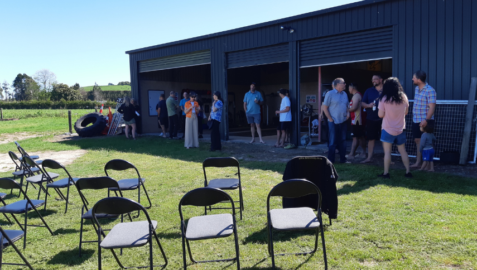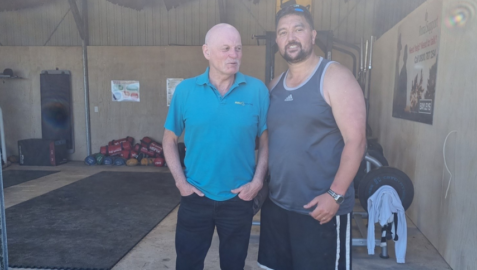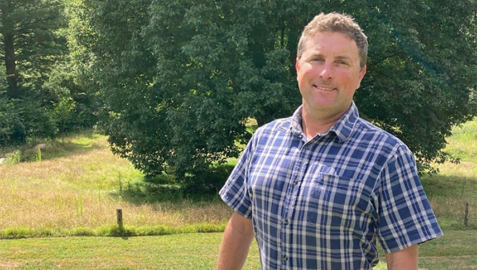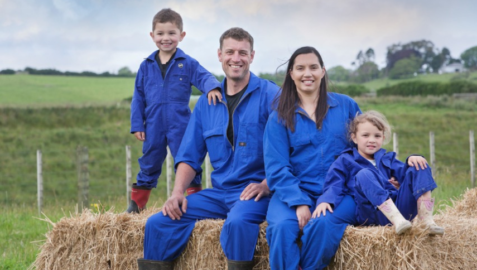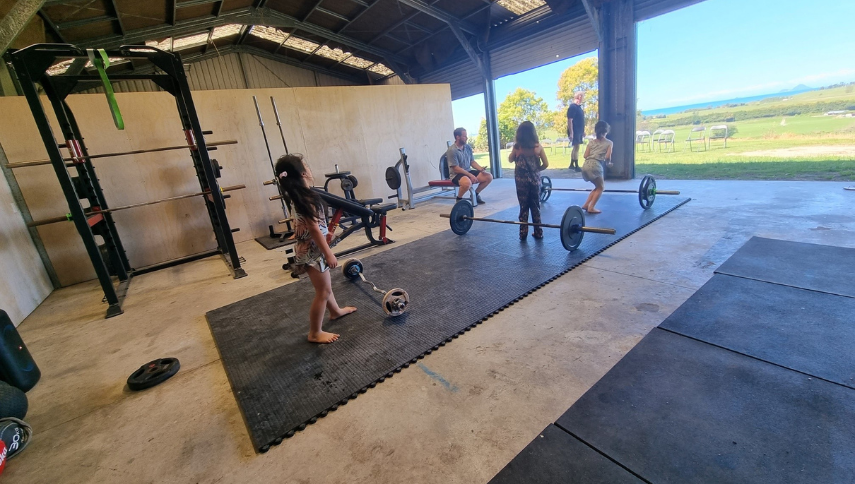
Farmer Wellbeing Hub Launched in Pukehina
Module Overview
Bay of Plenty dairy farmer Mohi Beckham-Adams recently opened an on-farm gym and community hub for local farmers. Here’s why.
Tell us about the hub. What’s the set-up?
Basically, we’ve lined a big shed behind my house with ply and filled it with gym gear, weights and machines, so local farmers can get together and work out no matter what the weather’s doing. We used to have a smaller area, but we outgrew that, so we had a working bee and made over one of our workshops. It’s like an F45-type gym with kitchen facilities and places to hang out.
Sounds impressive.
Yeah, it’s pretty cool, mate. [laughs].
What sort of numbers have you been pulling in?
Even when it’s a busy time on farm, we’re getting six to ten farmers along a couple of nights a week. We work out for an hour, then we have bit of a yarn after and chew the fat. Sometimes that can last until midnight [laughs]. It’s been fun.
Some farmers might question the wisdom of heading to a gym after a day’s physical work. What are the benefits?
Oh man, there are so many. It helps you eat healthier, sleep better, worry less. It makes on-farm work easier on the body. Your whole body and mind just start to improve.
It sounds like it’s got a social side too?
Yes, that’s huge. I came across a local guy the other night who’d I’d only known for a wee while and by the end of the night he was opening up to me about all sorts of things. It’s not just about pumping weights, it’s also about warmth – making people feel welcome. Anyone going through challenges in life would find it helpful.
You’ve had your own mental health struggles, haven’t you?
Yes, I’ve struggled at times with depression and burnout. I’ve made a conscious effort to live and work differently since then. That’s one of the reasons we got this hub going.
What are the main challenges in farming?
I think a lot of people are under so much pressure to make their farming system work, that other things fall by the wayside. That takes a real toll on people’s health, family and work-life balance.
Your gym sounds like an antidote to all that.
Yeah, big time. Coming here at night, you sweat out all that frustration and catch up with people who know exactly what you’re going through. We also get along our local Surfing for Farmers as a group and have a sausage, a beer and surf there. We big supporters of that too. Boyd Harris is doing a wicked job there.
How would you describe your approach to farming now?
Our approach is that we think farming systems should fit people, not the other way round. We’ve got a 500-cow herd on our farm and next month our cows will dry off, so our team can have a summer break, instead of the usual winter break in June. That’s a big improvement in people’s lives. We’ve been making changes like that to our systems since we took over in 2019.
What guides your business decisions?
Everything we do on this farm has to be good for the people, the whenua (land) and the animals. It has to tick all three boxes. So, for us, it’s not just about milk production. My experience is if you’re just go hard out for milk all the time, you’re going to lose something else along the way. If we make a ton of money, but the people are run into the ground, that’s not a win. That’s how we see it.
What about workload? Long hours can be a big issue for farmers.
I know, I used to work 70 to 80 hours a week myself, which is stupid. We milk once a day here and our workers do around 40 hours a week. That means if they’ve got a sport or family activity at night, they can go without feeling buggered or missing out.
I still put in longer hours myself, but I spend a lot more time brainstorming and working on the business, rather than physically working outside. The benefit of that is that you don’t sweat the small stuff as much. You’re giving yourself space to stand back and see the big picture, which helps manage pressure. So often on a farm, the day turns to shit because you’re chasing your tail. I don’t do that anymore.
What do you think about Farmstrong?
I love it. It’s been a big part of us since I ran across it. A lot of the ideas Farmstrong promotes have been a part of Maori culture for centuries, so we’ve simply amalgamated them into our own kaupapa. We’re not reinventing the wheel here, we’re just going back to what has always worked for Maori – putting whanau first. We believe if you nourish the mind and body, the farm will go well too.
What did you tell people at your launch?
I just shared my story, the challenges I had growing up and what I do now to deal with the ups and downs of farming. Then we had a hangi and a big family-style catch-up til late. There were lots of kids running round and watching movies in the lounge. We wanted to show people that our farming is based around love and whanau and let them experience what Maori culture’s all about. Hopefully they went home with a full stomach and a full heart.
How has developing the Pukehina hub helped your health?
Two years ago, the farmers who came here were more like acquaintances doing some push-ups with me in a field. Now they’re like brothers and our kids are like cousins. For me, that’s what farming should be about – whanau and community. If I’m going to work here forever, I want to be able to go down the road and drop in on one of the bros and have a cup of tea or a beer and have a chinwag in the cowshed. I want to farm in a way that means my children have other kids to play with.
I think we’ve lost that sense of connection in some of our rural communities. People are too busy to know anyone or turn up at events. Being isolated and busy all the time isn’t good for you or the farm. When you’re burnt out, you start cutting corners, making poor decisions and you’re just not good to be around or work for. Everyone needs something to recharge those batteries. That’s why we started this.
What does it take to get something like a hub happening?
Time and enthusiasm. It’s not about money. You just need a good group of people to help you. I’m grateful to the farm owner and directors at Scylla dairy for allowing me to go down this track and follow this kaupapa. Jodie Craig at Rural Support has been a huge help too.
I find giving back to the community actually gives me energy. I like seeing people with a smile on their face. That’s what gets me going.
So, what’s next?
If this concept works, I’d love to roll it out on a lot of iwi farms, because I think they will get where I’m coming from. The non-Maori who come here get it too, but I think there are still a lot of people out there whose lives are only driven by the dollar.
What does being Farmstrong mean to you?
I think it’s about sharing your vulnerabilities and helping others. It’s about cameraderie, family and friends. It’s a bit like cooking a cake. You know how it always tastes better when it’s done with love? Well, that’s how I want to farm.
Farmstrong is a nationwide, rural wellbeing programme that helps farmers and growers cope with the ups and downs of farming. For free tools and resources check out www.farmstrong.co.nz
